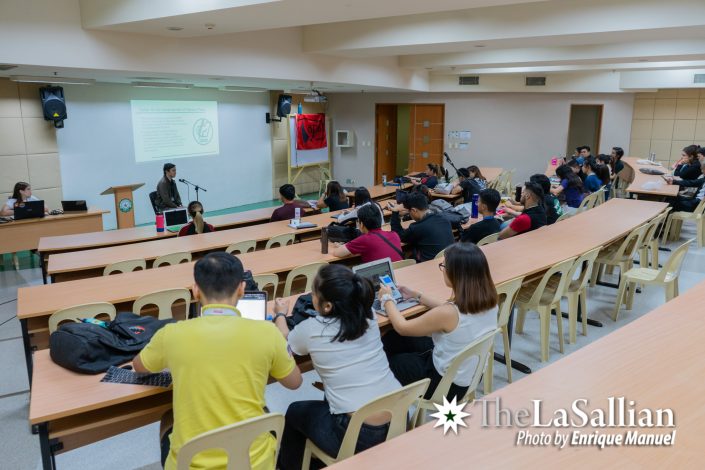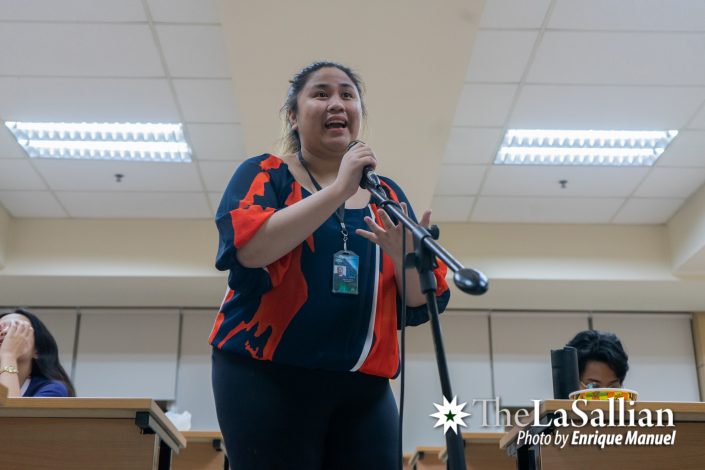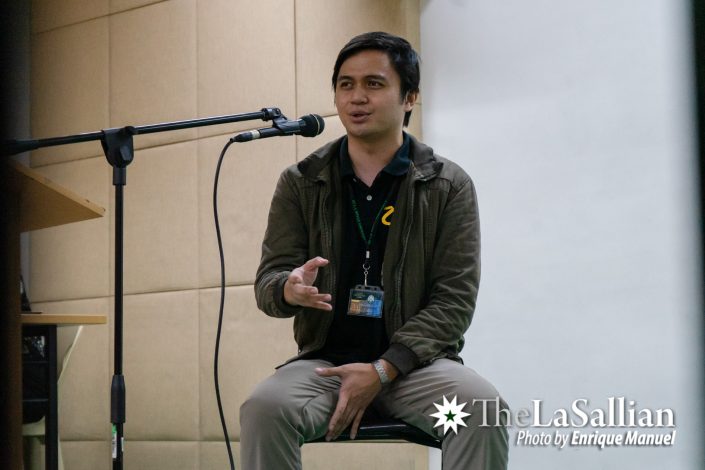In line with the growing concern surrounding press freedom in the country, Alyansang Tapat sa Lasallista held the third installment of their Usap Tayo series last March 6, titled USAP TAYO: Defend Press Freedom, at room A1403 of Br. Andrew Gonzalez Hall, in partnership with the College Editors Guild of the Philippines (CEGP).
The talk focused on ABS-CBN’s franchise renewal, on issues affecting campus journalism, as well as on the threats that are aimed toward media organizations and critics of the administration of President Rodrigo Duterte.
Press freedom explained
CEGP National Office Deputy Secretary General Ryan Joseph Martinez defined press freedom as a “constitutional guarantee”, granted through the Bill of Rights in the 1987 Constitution and as a democratic right to publish and determine content, and emphasized that press freedom lies at the feet of human rights. “We cannot separate ‘yung issue na nararanasan ng masa, nararanasan ng sino man, maging ng mga ordinaryong tao, sa kampanya ng pagtatanggol sa karapatan sa [malayang] pamamahayag,” Martinez explained.
(We cannot separate the concerns of citizens, even ordinary people, with the campaign to defend press freedom.)
With the central role that press freedom plays in helping people voice out key issues, Martinez affirmed that CEGP is not alone in the fight to preserve press freedom, as “ordinary people” themselves are part of the struggle. “Nandiyan pa rin ‘yung batayang masa or ‘yung [mga] mamamayan para ipagtanggol ‘yung press freedom,” he said.
(The people or citizens will still be there to defend press freedom.)
Martinez also took note of the issues affecting campus press freedom inside universities and how student publications are viewed by the public. Defining campus press freedom as a form of “tangible expression”, he emphasized that the campus press serves as a student institution “that is a product of a democratic assertion”, and that it serves as a platform for students to air their concerns.
Why ABS-CBN’s franchise renewal matters
Even with the safeguards established through the 1987 Constitution, various threats to press freedom across all levels have already emerged. “Over the past years, mayroong shift [sa] dynamics in the campaign on press freedom. We’re seeing a lot of coordinated or consolidated efforts to suppress freedom of speech in our country,” Martinez explained.
Among the critical issues Martinez enumerated was the pending franchise renewal of ABS-CBN. “Until the present, we’re seeing how legal measures are being used to silence critics,” he argued.
The broadcast network is currently facing a quo warranto petition filed by Solicitor General Jose Calida, who is seeking to end their allegedly “highly abusive practices.” Additionally, the House of Representatives has delayed discussions on the 11 bills filed regarding the ABS-CBN franchise renewal. They will only begin tackling these on March 10, barely four days before Congress is set to take a scheduled two-month break.

Despite the challenges posed by the ABS-CBN dilemma, Martinez has seen a silver lining. “[N]akikita natin na ‘yung press freedom issue has become popularized. It is much easier to discuss issues of press freedom, kung bakit siya kailangan, and so on,” he added. In response to this, CEGP and the National Union of Journalists of the Philippines have been organizing Black Friday mobilizations to “call for the discussion of ABS-CBN’s franchise renewal in the proper channels.”
(We have seen how the press freedom issue has become popularized. It is much easier to discuss issues of press freedom, why it is necessary, and so on.)
A call for repeal
Martinez also closed in on CEGP’s call to repeal the Campus Journalism Act, claiming that the law failed to prevent incidents of campus press freedom violations. The Campus Journalism Act, signed into law in 1991 by late President Corazon Aquino, was originally established to “promote and uphold” the campus press, which was suppressed during the Martial Law era. However, alleged flaws in the act have triggered criticism from a variety of groups over the years.
A prime example of such flaws, as Martinez described, is intervention in campus press affairs by school authorities, who can also threaten the defunding of said publications. Instead of advancing student interests, school administrators would use student organizations to “advance their interests”, according to Martinez.
Moreover, Martinez explained that the call for the act’s repeal is also based on the rising concern for the safety of campus journalists during coverage, who are at risk of being exposed to violence. The act currently does not have explicit provisions that would protect student journalists from press freedom violations. Some of the violations identified by the CEGP include censorship, withholding or looting of funds, and administrative intervention.
A number of bills have been proposed to replace the Campus Journalism Act, such as the Campus Press Freedom Act of 2018 (Senate Bill 1868), but these have floundered in the legislature.


